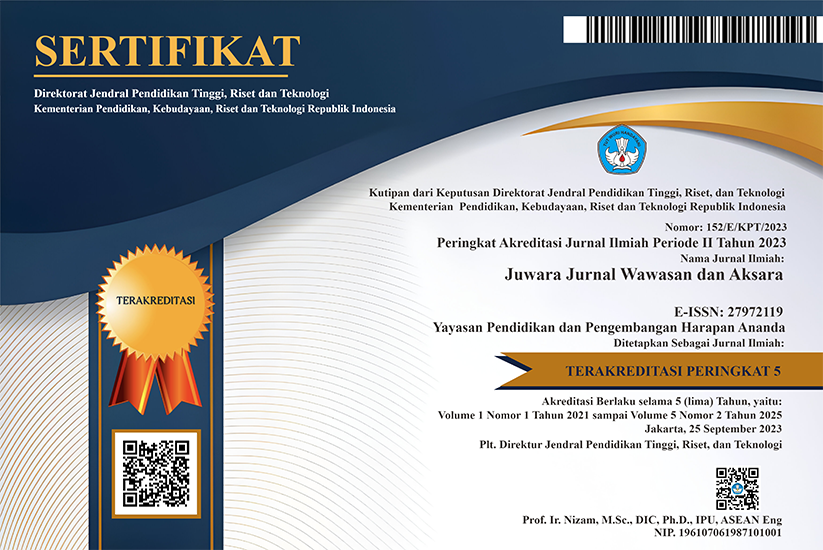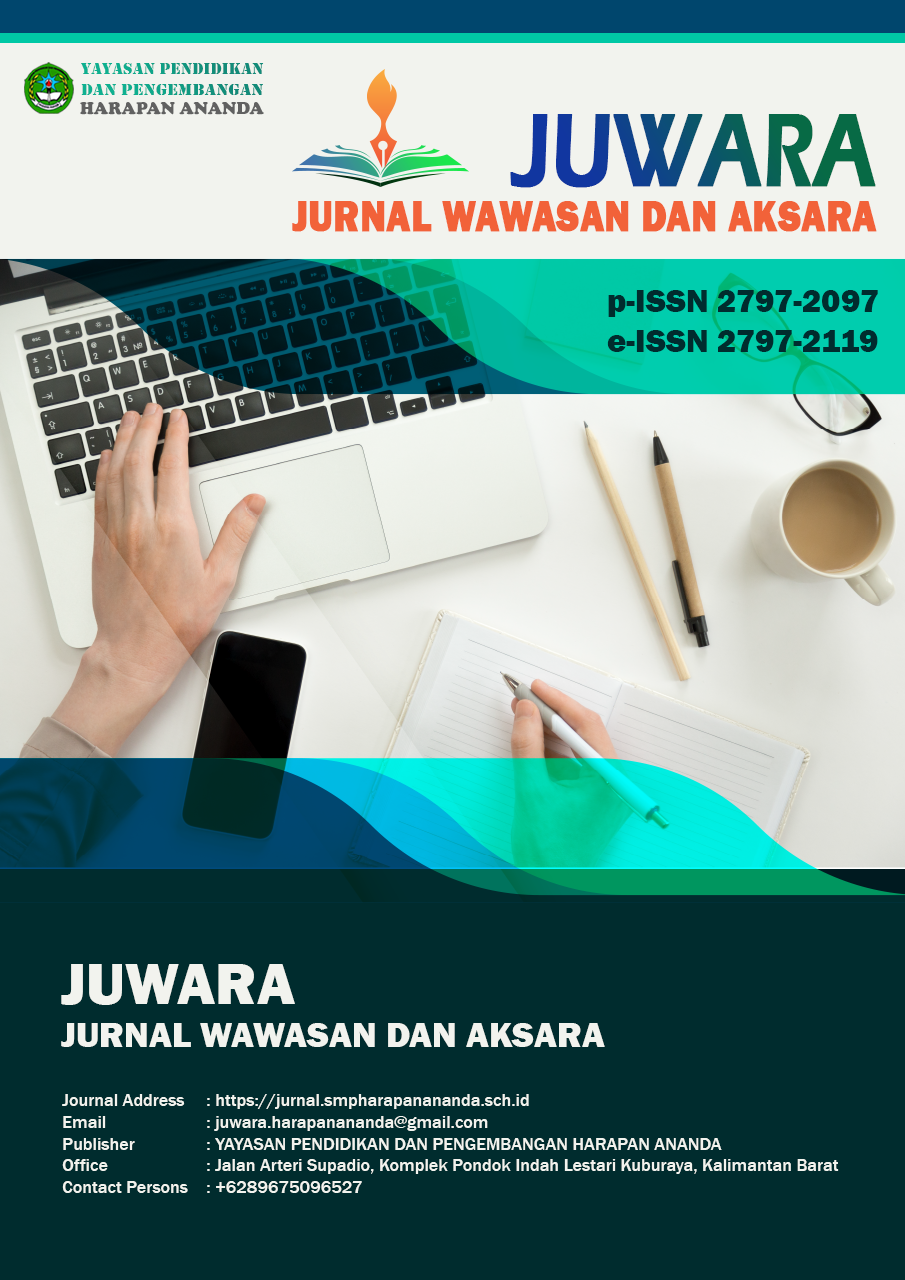Narrative Study: Soft Skills Based on the Life Experiences of Culinary Entrepreneurs
DOI:
https://doi.org/10.58740/juwara.v5i1.378Keywords:
culinary entrepreneur experience, narrative study, soft skills, tvetAbstract
Entrepreneurship is one of the goals of vocational education besides working and continuing education. Around 85% of soft skills can answer the success of students or vocational graduates including culinary majors. But there are many obstacles that must be faced, such as tight competition in the world of work and even the difficulty of building your own business. With these problems, we aim to deepen some of the soft skills needed by students or vocational graduates in the culinary field. The descriptive narrative method with in-depth interviews with culinary maestros was carried out to obtain these soft skills. The culinary maestros we interviewed are some of those who certainly have a culinary business and are easy for us to reach or meet with the accidental sampling technique we found three culinary maestros that we interviewed. Our findings are 1) communicative & friendly; 2) motive or desire & Decision-making including problem solving; 3) perseverance & tenacity; 4) discipline & honesty; 5) cooperation & adaptability; 6) creative & innovative. These findings will have an impact on culinary students or graduates and even other vocational fields, and of course with proper guidance from educators.
References
Almeida, F., & Devedzic, V. (2022). The Relevance of Soft Skills for Entrepreneurs. Journal of East European Management Studies, 27(1), 157–172. https://doi.org/10.5771/0949-6181-2022-1-157
Angelelli, C. V., Ribeiro, G. M. de C., Severino, M. R., Johnstone, E., Borzenkova, G., & da Silva, D. C. O. (2023). Developing critical thinking skills through gamification. Thinking Skills and Creativity, 49, 101354. https://doi.org/10.1016/j.tsc.2023.101354
Ariyanto, A., Andi, D., Abid, M., Oktavianti, N., Amelia, R. W., Wiguna, M., Safiih, A. R., Purwanti, Wijoyo, H., & Devi, W. S. G. R. (2021). Entrepreneurial Mindsets & Skill (H. Wijoyo & A. Aritanto (eds.); 1st ed.). Insan Dendekia Mandiri. https://www.researchgate.net/publication/351357742_Entrepreneurial_Mindsets_Skill
Blackie, E. R. L., Weststrate, N. M., Turner, K., Adler, J. M., & McLean, K. C. (2023). Broadening our understanding of adversarial growth: The contribution of narrative methods. Journal of Research in Personality, 103, 104359. https://doi.org/10.1016/j.jrp.2023.104359
Borms, L., Van Opstal, W., Brusselaers, J., & Van Passel, S. (2023). The working future: An analysis of skills needed by circular startups. Journal of Cleaner Production, 409, 137261. https://doi.org/10.1016/J.JCLEPRO.2023.137261
da Costa, C. D. M., Miragaia, D. A. M., & Veiga, P. M. (2023). Entrepreneurial intention of sports students in the higher education context - Can gender make a difference? Journal of Hospitality, Leisure, Sport & Tourism Education, 32, 100433. https://doi.org/10.1016/j.jhlste.2023.100433
Diandra, D. (2019). Meningkatkan Kemampuan Softskill Dalam Berwirausaha. SNEB: Seminar Nasional Ekonomi Dan Bisnis Dewantara, 1(1), 97–102. https://doi.org/10.26533/sneb.v1i1.416
Dreyer, C., & Stojanová, H. (2023). How entrepreneurial is German Generation Z vs. Generation Y? A Literature Review. Procedia Computer Science, 217, 155–164. https://doi.org/10.1016/j.procs.2022.12.211
Fadlurrohim, I., Husein, A., Yulia, L., Wibowo, H., & Raharjo, S. T. (2020). Memahami Perkembangan Anak Generasi Alfa Di Era Industri 4.0. Focus: Jurnal Pekerjaan Sosial, 2(2), 178. https://doi.org/10.24198/focus.v2i2.26235
Fernandez Rivas, D., & Husein, S. (2022). Empathy, persuasiveness and knowledge promote innovative engineering and entrepreneurial skills. Education for Chemical Engineers, 40, 45–55. https://doi.org/10.1016/j.ece.2022.05.002
Garcez, A., Silva, R., & Franco, M. (2022). The Hard Skills Bases in Digital Academic Entrepreneurship in Relation to Digital Transformation. Social Sciences, 11(5), 192. https://www.mdpi.com/2076-0760/11/5/192
Indra, M., Pardjono, P., Rahdiyanta, D., Munadi, S., Syarifuddin, S., Widari, T., & Albaqi, Y. R. (2023). Desire or Routine? Evaluating Their Influence on Computer-Aided Design Learning Achievement. Journal of Technical Education and Training, 15(4), 114–128. https://doi.org/10.30880/jtet.2023.15.04.010
Jaya, S., & Mukhlasin, A. (2021). Realization of Managerial Competence in Effective Leadership. In EDUTEC: Journal of Education And Technology (Vol. 4, Issue 4, pp. 659–665). http://ejournal.ijshs.org/index.php/edu/article/view/240
Kurniawan, E., Bandono, A., & Aris, A. (2020). The Influence of Competency Factors, Career Development and Motivation on Personnel Performance. International Conference on Maritime Science and Technology, 4(1), 1–11. http://seminarpasca-sttal.ac.id/index.php/seminarpasca-sttal/article/view/47
Masitoh, G., Rusdarti, R., & Rozi, F. (2022). The Influence of Field Work Practices, Entrepreneurship Knowledge, and Family Environment on Entrepreneurial Interests Through Soft Skill. Journal of Economic Education, 11(2), 278–286. https://journal.unnes.ac.id/sju/index.php/jeec/article/view/68633
McGrath, S., & Yamada, S. (2023). Skills for development and vocational education and training: Current and emergent trends. International Journal of Educational Development, 102, 102853. https://doi.org/10.1016/j.ijedudev.2023.102853
Mikhailova, A., Smetanina, O., Golovko, O., Mirontseva, S., & Baiko, V. (2022). Communicative technology in the multidisciplinary maritime field of activity. Transportation Research Procedia, 63, 329–337. https://doi.org/10.1016/j.trpro.2022.06.020
Mirzagitova, A. L., Mukhametgaliyeva, S. H., & Tirigulova, R. H. (2015). Realization of Competence-based Approach in Preparation of the Competitive Specialist. Procedia - Social and Behavioral Sciences, 191, 1938–1940. https://doi.org/10.1016/j.sbspro.2015.04.288
Muhmin, A. H. (2018). Pentingnya Pengembangan Soft Skills Mahasiswa di Perguruan Tinggi. Forum Ilmiah Indonusa, 15(2), 330–338.
OECD. (2019). OECD Employment Outlook 2019. OECD. https://doi.org/10.1787/9ee00155-en
Pebrianto, A., & Puspitowati, I. (2022). Effect of Entrepreneurship Education and Soft Skills on Entrepreneurship Intentions. Proceedings of the 3rd Tarumanagara International Conference on the Applications of Social Sciences and Humanities (TICASH 2021), 655 (Ticash 2021), 1473–1477. https://doi.org/10.2991/assehr.k.220404.236
Perpres No. 8. (2012). Peraturan Presiden (PERPRES) Nomor 8 Tahun 2012 Tentang Kerangka Kualifikasi Nasional Indonesia. DATABASE PERATURAN JDIH BPK. https://peraturan.bpk.go.id/Details/41251/perpres-no-8-tahun-2012
Prihatin, B., Riyanti, D., Sandroto, C. W., Tri, M., & Soft, W. D. W. /. (2016). Soft Skill Competencies, Hard Skill Competencies, and Intention to Become Enterpreneur of Vocational Graduates. INTERNATIONAL RESEARCH JOURNAL OF BUSINESS STUDIES, 9(2). https://irjbs.com/index.php/jurnalirjbs/article/view/1161
Purwanti, S., Rahman, L. R., Hamid, A. K. bin A., & Indra, M. (2024). Supporting aspects of entrepreneurial interest: an empirical study reviewing creative, strategic, and digital competencies (EI-CSDC). Jurnal Pendidikan Teknologi Dan Kejuruan, 30(2), 173–188. https://doi.org/10.21831/jptk.v30i2.71281
Rakasiwi, P. G., Sukardi, T., Indra, M., & Aldo, J. (2023). The Role of Mediation of Work Motivation in Determining Working Readiness of Vocational School Students. Mimbar Ilmu, 28(3), 382–393. https://doi.org/10.23887/mi.v28i3.65109
Rosmi, F., Imawati, S., & Aryandini, S. N. (2020). Kreativitas Generasi Z selama Masa Pandemi di Kelurahan Larangan Selatan. Prosiding Seminar Nasional Pengabdian Masyarakat LPPM UMJ, 1(1). https://jurnal.umj.ac.id/index.php/semnaskat/article/view/8852
Ruiz, M. D. A. (2022). Development of soft skills and entrepreneurial intention in university students. TECHNO REVIEW. International Technology Science and Society Review, 12(4), 1–11. https://doi.org/10.37467/revtechno.v11.4468
?enocak, S. Ü., & Demirk?ran, F. (2023). Effects of problem-solving skills development training on resilience, perceived stress, and self-efficacy in nursing students: A randomised controlled trial. Nurse Education in Practice, 103795. https://doi.org/10.1016/j.nepr.2023.103795
Škare, M., Blanco-Gonzalez-Tejero, C., Crecente, F., & del Val, M. T. (2022). Scientometric analysis on entrepreneurial skills-creativity, communication, leadership: How strong is the association? Technological Forecasting and Social Change, 182, 121851. https://doi.org/10.1016/j.techfore.2022.121851
Suhairi, Wardani, S., Nasution, D. A., & Siregar, R. Z. F. (2023). Pengantar Pemasaran Global. Jurnal Mirai Management, 8(1), 241–251. https://journal.stieamkop.ac.id/index.php/mirai/article/view/3772
Syahril, S., Hastuti, K. P., & Arisanty, D. (2023). Program Mbkm: Sebuah Dilema Bagi Perguruan Tinggi? JPG (Jurnal Pendidikan Geografi), 10(1), 2023. https://doi.org/10.20527/jpg.v10i1.15666
Tem, S., Kuroda, A., & Tang, K. N. (2020). The Importance of Soft Skills Development to Enhance Entrepreneurial Capacity. International Educational Research, 3(3), p1. https://doi.org/10.30560/ier.v3n3p1
Ubfal, D., Arráiz, I., Beuermann, D. W., Frese, M., Maffioli, A., & Verch, D. (2022). The impact of soft-skills training for entrepreneurs in Jamaica. World Development, 152, 105787. https://doi.org/10.1016/j.worlddev.2021.105787
Widari, T., Aliffianti, & Indra, M. (2023). Fast fashion: Consumptive behavior in fashion industry Generation Z in Yogyakarta. IAS Journal of Localities, 1(2), 104–113. https://doi.org/10.62033/iasjol.v1i2.18
Widari, T., Aliffiati, A., & Indra, M. (2024). Ngemong Bocah: Pengaruh Budaya Pengasuhan Keluarga terhadap Kejadian Pneumonia. Juwara Jurnal Wawasan Dan Aksara, 4(1), 106–120. https://doi.org/10.58740/juwara.v4i1.89
Widari, T., Aliffiati, Rahman, L. R., & Indra, M. (2024). Anti-Mainstream Culinary: The Influence of Post-Modernism on Gastronomy in Indonesian Restaurants. IAS Journal of Localities, 2(1), 69–81. https://doi.org/10.62033/iasjol.v2i1.36
Downloads
Published
How to Cite
Issue
Section
License
Copyright (c) 2025 Luthfi Riyadh Rahman, Nur Wahyuni, Ika Wahyu Kusuma Wati, Muhammad Indra, Tika Widari

This work is licensed under a Creative Commons Attribution-NonCommercial 4.0 International License.
JUWARA: Jurnal Wawasan dan Aksara provides open access to anyone so that the information and findings in these articles are useful for everyone. This journal's article content can be accessed and downloaded for free, following the creative commons license used.




















